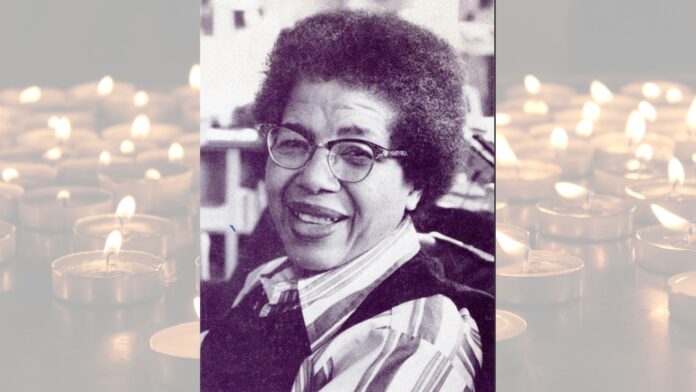
Cheryl Clarke opened a virtual memorial service for Anita Cornwell, who died in May at age 99, by reading a passage from Cornwell’s book “Black Lesbian in White America.”
“So, what would my life have been like if I had not become a Gay womin? I don’t exactly know, but I am damn sure glad I will never have to find out.”
Members of Sinister Wisdom, a lesbian literary and arts journal which has heavily featured Cornwell’s work, hosted the Sept. 21 service. Several speakers read passages from Cornwell’s work where she wrote about sexism, racism and her overall experience growing up as a Black lesbian.
Sinister Wisdom’s service was the first of two services to honor the late writer. The second will be an in-person memorial at William Way LGBT Community Center on Sept. 30. This service will also include readings of Cornwell’s work as well as a sampling of materials from her literary and personal papers, held in the John J. Wilcox, Jr. Archives at William Way LGBT Community Center.
John Anderies, the director of the John J. Wilcox, Jr. Archives at William Way, said Cornwell’s archives span about 18 banker boxes featuring personal materials such as family photographs and drafts of her work, which illustrate the process she went through to perfect her writing over time.
“There’s a lot that’s not known about Anita — not widely known — because she faced so much oppression and obstacles and had difficulty throughout her life getting published,” Anderies said. “Her collection is full of rejections from publishers, and she would just really persevere until she could get something published. But there’s so much that she wrote that never got published. It’s exciting that we have those materials, and then make them available to researchers going forward. Her influence is not done, by any means. I suspect there’s a lot to be learned from what she has written.”
Anderies referred to the archives as a “lovely collection” and he is “thrilled” to make them publicly available.
“She [seemed] to have been consumed with writing all the time,” Anderies said. “She has journals where she writes about her everyday experience, kind of like a diary. And then sometimes those turned into her writing something — some sort of fiction story. There’s little scraps of paper with her writing on them. We’ve got correspondence of hers, primarily with other lesbians across the United States that she was both friends [with and] banded together to publish work [with].”
These materials will be on display at the memorial service but Anderies said researchers can also make an appointment to view them at William Way by reaching out via email at [email protected].
Wynn Eakins, who worked as William Way’s intern and helped process Cornwell’s papers, moved to Philadelphia in 2019. Eakins said that after doing some casual research on Google, they immediately felt a connection to Cornwell’s story. Much like Cornwell — who moved north from South Carolina — Eakins also moved north from a southern state. In their case, it was Virginia.
“[After] moving to Philadelphia and finding her collection, I was like, ‘Wow, there is another Black lesbian person that I can connect to, and just kind of see how her journey really mirrors my own,” said Eakins, who plans to speak at the upcoming memorial. “But of course, it was just even richer finding out that she was a lesbian, that she was a feminist, [and] that she was asking these really important, analytical, political, subversive questions throughout her writing.”
While Eakins initially got to know Cornwell through research, they also had the “profound honor” of visiting Cornwell twice during her stay at a nursing home. Before her death, Cornwell suffered from dementia for nearly 20 years, during which she lived at Wesley Enhanced Living Center at Stapeley. When Eakins was gathering materials about Cornwell, they got in touch with Cornwell’s friend Sharon Hurley. Hurley invited Eakins to join her during a visit with Cornwell. During these visits, they would sit in Cornwell’s room and listen to music.
“It was a really sweet moment, just to be in the room with her and just witness how far she’d come,” Eakins said. “It’s kind of sobering, looking at someone who’s that much older and who’s on hospice kind of near the end of their life, thinking about where we all sort of can or will end up one day. It makes it feel even more important to honor her life’s work and to keep her memory alive.”
Eakins hopes for the collection of Cornwell’s materials to be fully digitized so “people — not only in Philadelphia but in wider communities all around — can digitally access her work,” which includes not only Cornwell’s writing, but also her activism work. Cornwell was involved with Daughters of Bilitis, Women Organized Against Rape and numerous Black writers’ associations. She was also one of the founding members of the Philadelphia chapter of Radicalesbians.
“I think her legacy lives on by us continuing to put that [information] out there and just letting people know who she is, and what she did,” Eakins said.
The memorial for Anita Cornwell will be held 2 p.m. Sept. 30 at William Way LGBT Community Center, 1315 Spruce St.